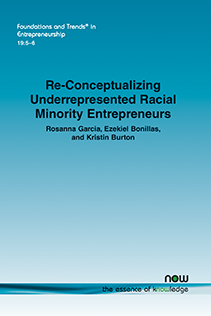Re-Conceptualizing Underrepresented Racial Minority Entrepreneurs
By Rosanna Garcia, Worcester Polytechnic Institute, USA, rgarciaphd@wpi.edu | Ezekiel Bonillas, California State University, San Bernardino, USA, ebonillas@csusb.edu | Kristin Burton, Purdue University Northwest, USA, burto122@purdue.edu
Abstract
In recent publications, entrepreneurship researchers have begun to note the changing environments underrepresented racial minority (URM) entrepreneurs face in the modern world (Bates et al., 2022; Peterson and Crittenden, 2020). We build upon these extant studies by reconceptualizing the URM entrepreneur by noting (a) their historical role as wealth creators in the formation of the United States, (b) their approaches to entrepreneurship, which includes cultural empowerment as an outcome, and (c) their distinctive voices as business owners that manage to survive, and even thrive, despite the institutional and environmental barriers they face as racial minorities. Unique to this study is the deconstruction of the URM entrepreneur (Ogbor, 2000) by URM academics, who have themselves also experienced racial inequities. Thus, we are able to reveal new insights about the URM entrepreneur that have previously not been addressed by other researchers and expose research gaps that we encourage addressing by the academy. This analysis culminates in the proposal of a new theory of the URM entrepreneur that reflects our findings.
Re-Conceptualizing Underrepresented Racial Minority Entrepreneurs
Re-conceptualizing Underrepresented Racial Minority Entrepreneurs gathers the voices of the Black American and Latino American entrepreneurs as collected by racial minority entrepreneurship scholars. The monograph has three primary goals: (1) provide a historical context of Underrepresented Racial Minority (URM) entrepreneurs - specifically Black American and Latino-Americans - illustrating their evolution, and contribution to the growth and development of the U.S. economy; (2) start a discussion of the U.S.-based racial minority entrepreneur that is unique from the immigrant entrepreneur; and (3) include in the academic discussion of the entrepreneur the voices of the URM entrepreneur as collected by the URM researcher.
This monograph sets a definition of the racial minority entrepreneur, which is unique from the ethnic entrepreneur thus providing a new definition of the URM entrepreneur. The authors proceed to provide a historical overview of the distinct contributions URM entrepreneurs have made - specifically to the development of the U.S. and their present-day economic impact. Next, a systematic literature review identifies 66 empirical studies that focus on U.S.-based URM entrepreneurs. This literature review provides a qualitative analysis of URM entrepreneurs and offers suggestions for future research.
